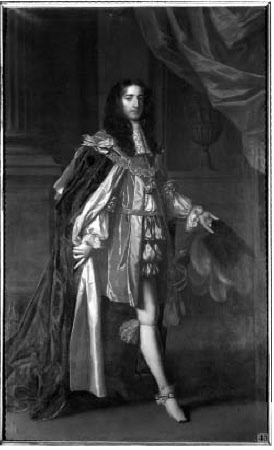King William III (1650–1702), as Prince of Orange in Garter Robes
studio of Sir Peter Lely (Soest 1618 – London 1680)
Category
Art / Oil paintings
Date
circa 1677 - 1680
Materials
Oil on canvas
Measurements
2184 x 1397 mm (86 x 55 in)
Order this imageCollection
Attingham Park, Shropshire
NT 608991
Caption
There were at one point no less than four portraits of William III at Attingham. They were probably acquired by different family members. William invaded England in 1688, ultimately deposing James II and James IV, becoming King of England, Scotland and Ireland. This portrait is of William before he seized the throne, as he is wearing the robes of the Order of the Garter. He was admitted to the Order in 1653, but was not installed until the end of his visit to England in 1670/71. However, he looks too old here to have been painted then. It seems possible that it was painted around 1677, since this portrait bears many similarities to another of William III painted by Lely around that time.
Summary
Oil painting on canvas, King William III (1650–1702), as Prince of Orange in Garter Robes, studio of Sir Peter Lely (Soest 1618 – London 1680), circa 1677/80. A full-length portrait, standing, to right William III as young man with long curling hair, head facing, his right foot forward. He is wearing garter robes and long black wig holding a plumed hat is in his left hand while his right hand holds back his cloak.
Provenance
Attingham collection. 1847 Catalogue of Paintings, p.19; 1861 Inventory p.224; 1913 Inventory p.65; bequeathed to the National Trust with the estate, house and contents of Attingham by Thomas Henry Noel-Hill, 8th Baron Berwick (1877-1947) on 15th May 1953.
Credit line
Attingham Park, The Berwick Collection (National Trust)
Marks and inscriptions
55 on frame and 147
Makers and roles
studio of Sir Peter Lely (Soest 1618 – London 1680), artist possibly Willem Wissing (Amsterdam 1656 - Burghley House 1687), artist
References
Ingamells, 2009: John Ingamells, Later Stuart Portraits 1685-1714, National Portrait Gallery, London, 2009, pp. 324-325

